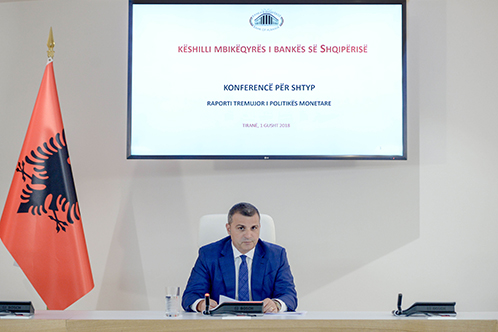BANK OF ALBANIA
PRESS RELEASE
Governor Sejko: Statement to the Press Conference on the Monetary Policy Decision of the Supervisory Council of the Bank of Albania, 1 August 2018
Publication date: 01.08.2018
The Albanian economy continued to pursue a positive development trend in the first half of 2018. Economic activity has been proceeding along an upward growth path, enabling thus the expansion of employment, increase in wages, improvement of firms’ financial situation, and gradual build-up of inflationary pressures.
These developments have been underpinned by the improvement in the external environment, the improvement of confidence in the economy, the favourable financial conditions, dictated by our accommodative monetary policy, and positive supply-side shocks.

Our expectations for the outlook remain positive. Yet, their materialisation requires maintaining the accommodative monetary policy stance, while the balance of risks remains skewed to the downside.
Average inflation registered 2.2% in the second quarter, upward from 1.9% registered in the first quarter. In particular, inflation hit 2.4% in June. The balance of inflationary pressures continues to be formed by a gradual build-up trend of domestic pressures and short-term fluctuations in the prices of specific items in the consumption basket.
The pickup in inflation in the second quarter reflected the resultant effect of two shocks in opposite directions. On the one hand, the rise in oil prices in international markets led, in turn, to higher production costs and had an upward impact on inflation. On the other hand, the appreciation of the exchange rate decelerated the pass-through of foreign inflationary pressures to the domestic market. The effect of the first factor was more intensive in the second quarter, but this effect is expected to be shorter in time.
Our projections suggest that inflation will converge toward our target within 2020. This projection takes into account the positive dynamics of economic growth and our expectations for the return of the economy to equilibrium in the first half of the next year. Also, it is based on the assessment that disinflationary pressures from the appreciation of the exchange rate will remain transitory.
These judgments are corroborated by economic and monetary data of the first half of the year.
The Albanian economy grew 4.45% in the first quarter, and indirect data suggest positive growth rates will continue in the second quarter. The acceleration of the economic growth pace in the first quarter reflected the rapid growth in electricity production, in response to favourable weather conditions. In the longer term, the expansion of economic activity was supported by the pickup in private consumption and investments, whereas the deficit of external trade expanded and the fiscal policy continued the consolidation trend. Indirect data suggest that these development trends have been carried into the second quarter.
The economic activity expanded, while employment improved and the unemployment rate fell to 12.5%. This is the lowest historical level of unemployment registered in Albania and suggests an increasingly fuller utilisation of production capacities in Albania. In response to it, the INSTAT reports that the average real wage increased by 2.3% in the first quarter, a positive premise for the gradual build-up of domestic inflationary pressures.
The domestic financial market remains calm and liquid, but appreciation pressures of the Albanian lek remain present in the foreign currency segment. The recent monetary policy measures - lowering the policy rate to 1.0% and intervention in the domestic foreign exchange market, with a view to preventing the rapid appreciation of the exchange rate, have proven to be effective.
The interest rates for the Albanian lek have been downward in the second quarter. Interest rates on loans, deposits and securities denominated in lek are currently at minimum levels. Credit to the private sector registered 5% average growth in the second quarter, with a more balanced contribution to growth between lek and foreign currency credit.
Overall, credit growth is in line with the moderate improvement of credit demand. However, the bank lending survey suggests that credit standards and loan terms and conditions applied by the banking sector remain conservative. The Bank of Albania finds that the fall in the credit risk and the steady improvement of balance sheets - as illustrated by the drop to 13.27% of the non-performing loans ratio - should be better reflected in the lending policies of the banking sector.
After the rapid appreciation of the exchange rate in the April - May period, the intervention of the Bank of Albania succeeded in calming the functioning of the domestic foreign exchange market and decelerated the appreciation of the exchange rate. Our analyses, however, suggest that the demand-supply ratio in the domestic foreign exchange market remains misbalanced, in part due to the high seasonal flows. In addition, the rapid and further appreciation of the exchange rate would impair the convergence of inflation towards our target in the medium term.
Judging on the above, the Bank of Albania deems that the current monetary policy stance remains adequate.
Taking into account these circumstances, the Supervisory Council decided to:
- Keep the policy rate unchanged, at 1.0%;
- Keep the interest rates on overnight deposit and overnight lending facilities, unchanged at 0.1% and 1.9%, respectively;
- Continue the purchase programme in the domestic foreign exchange market, aimed at decelerating the rapid appreciation of the exchange rate.
Maintaining an expansionary monetary policy stance in the medium term will serve to boost aggregate demand, contributing thus to employment gains, higher wages, and build-up of domestic inflationary pressures. The monetary stimulus is consistent with the fiscal policy consolidation and remains a necessary precondition for the convergence of inflation to our target within 2020.
In accordance with projections of the baseline scenario, and based on the available information, the Supervisory Council judged that the normalisation of interest rates in the domestic financial market will not resume before the second quarter of 2019.

 Twitter
Twitter
 Youtube
Youtube
 Facebook
Facebook
 Flickr
Flickr
 RSS
RSS
 Subscribe
Subscribe
 Feedback
Feedback